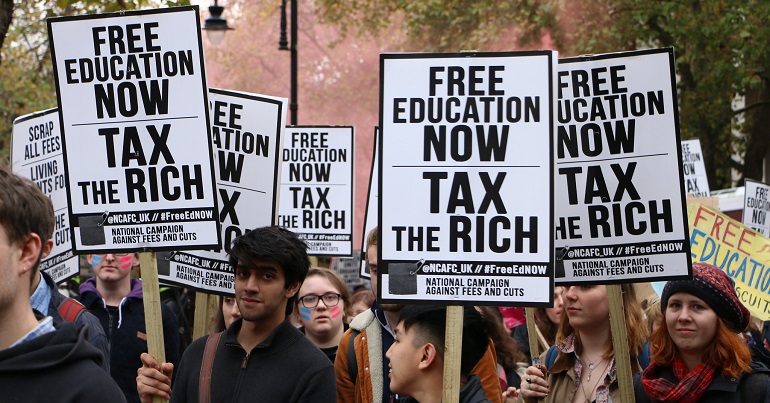Hey Jude: culture and class from inside a kettle
We had been kettled for 8 hours. In December. It was below freezing and the air was cut with the acrid smoke of burnt bus stop. “We need to make a bigger stink than them” the pyrotechnic had said, gesturing at Parliament. “Yeah, but we’re stuck here, we have to breathe.” He wasn’t popular.
To keep out the cold, Laurie had put on our small fire the novel she was reading. Shiv sacrificed the manuscript for his new book. Our bonfire huddle represented the older hacks – campaigning journalists and twentysomething activists who’ve been round a block or two compared to most of those present.
But we were a minority: maybe 2% of people there were the older usual suspects. A bigger minority -perhaps 30% – was university students. They were mostly white, mostly middlish class: a cross section of the kind of people who get to go to university in broken Britain. But a clear majority of the people kettled outside Whitehall that day were at inner city schools or further education colleges. Most weren’t white. I’d post with this blog numerous photos of young teenagers protesting in school uniform if the police hadn’t nicked my phone after Fortnum & Mason. A journalist who wasn’t there rang me to ask what was going on. I handed the phone to the nearest teenager and he spat rage: “they’re taking away my EMA – how will I afford sixth form? How will I ever get into uni?”
But after 8 hours of anger, we were mostly just cold, miserable, and terrified of being charged again by the thundering police horses. The chants had dried up, and we were too busy asking ourselves how long we could hold on before peeing on the Treasury building was the only remaining option to ask how to re-build Britain.
Various people or Trotskyite factions had attempted to give speeches or otherwise indoctrinate. Bizarrely, we stumbled on a Tory MP who had come out to see what was going on and thought that the minimum wage for 16 year olds was £7.50 an hour. In one corner, a sound system played some dance music down a loud hailer and a few followed the demands of the beat. But mostly, people were cold, despondent and depressed, hunched round little bonfires of placards and leaves to keep us going in the sub-zero temperatures.
Or, at least, they were until right before the end. Throughout the hours, there had been various attempts to cheer up the crowd – to turn this formative experience of political expression into a fun day of carnival and solidarity. But almost all of these had failed. None of the songs had been taken up, the chants had become blunt and dull. No one wanted to listen to yet more speeches.
None of the songs were taken up that is until one magical moment not long before I got out. After 8 hours, the police started to allow a slow trickle to leave. Everyone queued up, awaiting our turn – knowing we could be there for hours. Suddenly, someone next to me started singing Hey Jude. I joined in, as did a couple of others. Gradually, more and more people were singing: “better Better BETTER BETTER”. Another Beatles song followed, and another. Here, finally, was some culture that united us – the old hacks, the middle class university students and the working class black 16 year olds. Whilst we would all go home and turn on different radio stations, whilst we are all fans of different bands, singers or stars, we all knew the Beatles. Our parents – or grandparents I suppose – were the children of the 60s. They grew up at a time of relative economic equality. And their culture was so much less structured by class. And so to find some common songs in this crowd united by our belief in education and disgust at the government, we each had to reach back through the generations, to that era of equality – to the tunes which have echoed down the decades
Now, I’m sure there may have been other songs we would all have known. But it does seem that we have become more divided by culture as we’ve become divided by wealth: there is no one voice for my generation – we don’t have a Beatles. Thank god the Tories are there to unite us.



Another great post, Adam.